#Alexander Zvyagintsev
Explore tagged Tumblr posts
Text

Nebulae Come Sweet - De Lumière (April 20th, 2023) Country: Belarus Genre: Post-Metal
Lineup: Igor Kovalev - Vocals, Drums, Samples Dmitry Matveev - Vocals, Guitars Sergey Shidlovsky - Vocals, Bass Anastasiya Vashkevich - Cello, Strings
Guest/Session: Andrey Byzovsky, Aleksey Maksimov - Guitars Diana Gvozd - Piano Anastasya Trukhina - Violin Igor Shevtsov, Daniel Egorov - Trumpet Alexander Zvyagintsev - Accordion Ivan Izmalkin - Saxophone Igor Butz - Bass Alexandra Sidorevich - Vocals, Choir Alexey Shipulin - Spoken Voice, Choir
#Telegram#Nebulae Come Sweet#Post Metal#Igor Kovalev#Dmitry Matveev#Sergey Shidlovsky#Anastasiya Vashkevich#Andrey Byzovsky#Aleksey Maksimov#Diana Gvozd#Alexandra Sidorevich#Belarus#Anastasya Trukhina#Igor Shevtsov#Daniel Egorov#Alexander Zvyagintsev#Ivan Izmalkin#Igor Butz#Alexey Shipulin#Russia
0 notes
Text
The Father of Modern Arthouse: How Renowned Russian Director Andrey Tarkovsky Transformed World Cinema
The Soviet Union's Key Filmmaker of the Post-War Era Laid the Foundation for the Kind of Output taken for Granted by Movie Lovers Today
— April 28, 2023 | RT
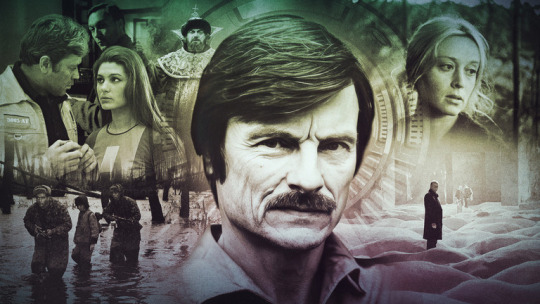
In the history of world cinema, the Soviet Union had two standout periods – the 1920s, during the boom of avant-garde cinema, and the late 1950s and early 1960s, during the "Khrushchev Thaw" (which was named for the opening up of society under the eponymous Nikita, after the years of terror under Joseph Stalin).
While the legendary Sergei Eisenstein, and other giants of the pre-war period, developed techniques that influenced the filming and montage of modern blockbusters, pictures of the latter period inspired arthouse genres.
Among the many post-war Soviet film directors, Andrey Tarkovsky had the greatest impact on world cinema. In 2018, the term “tarkovskian” – describing his unique “slow” and meditative style – was added to the Oxford Dictionary. Since Tarkovsky’s death in 1986, the influence of his cinematic style has spread from international film festivals to rock music clips and even video games.
Tarkovsky has a complicated reputation. His movies are often called “slow” and “boring." However, he remains the only Russian filmmaker of the second half of the 20th century whose work has become a yardstick for representatives of arthouse cinema, and whose name has inspired a search for a successor – for example, Mexican filmmaker Alejandro Gonzalez Inarritu and the Russian Andrey Zvyagintsev have both been called the “new Tarkovsky.”
What is it that makes Tarkovsky and his work so unique?
War, Home, and First Films
He was born in 1932. His father was poet Arseny Tarkovsky and his mother Maria – who later became the main character of one of his most prominent films, ‘The Mirror’ – was descended from the Dubasov noble family. She also attempted to write, but didn’t manage to build a literary career. Citing a “lack of talent,” she destroyed all her manuscripts.
Although Tarkovsky spent most of his life in Moscow, he was born in the village of Yuryevets in the Ivanovo region (about 500km northeast of the capital). After World War Two broke out, he was evacuated there with his mother – by that time his father had left the family. They lived in the village for just two years, but the wooden house would later reappear in ‘The Mirror’ as a symbol of an idyllic childhood. Throughout his life, Tarkovsky was haunted by the utopian image of “home.” In his films, a happy domestic life exists only in dreams (e.g., the central character's “lost” younger years from ‘Ivan's Childhood’) and memories. Meanwhile, Tarkovsky’s adult heroes often leave home (‘Solaris’), search for it (‘Nostalgia’), or destroy it (‘Sacrifice’).
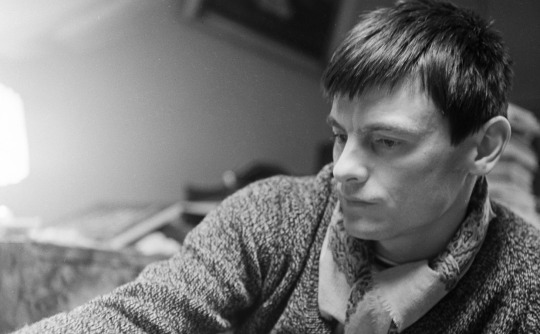
Andrei Tarkovsky © Sputnik/Alexander Makarov
In 1954, Tarkovsky entered the VGIK – the USSR’s most famous film institute. The beginning of his studies coincided with the Thaw period of cinema, which was radically different from previous Soviet movie eras. Young filmmakers who had gone through the war, or encountered it as children, were at the center of this new wave. During the Khrushchev years, the traditions of Stalin-era war cinema were reimagined. Similar processes occurred in other countries that contributed to the victory in WWII. The new motion pictures focused not on soldiers and battles, but on the unseen victims of the war for whom there was no place in Stalin's movies.
In the same year as Tarkovsky was admitted to VGIK, French critic and future film director Francois Truffaut published an article titled ‘A Certain Tendency of the French Cinema,’ where he formulated the Auteur Theory. Truffaut described how the filming process in earlier times was managed by producers and screenwriters, but how the director had become the key figure on the set, determining what to shoot and, most importantly, how the footage would be edited. The ‘auteur’ could be a director with an individual style or, as Tarkovsky said, an artist whose personality is “so significant that it determines the artistic qualities of the work.” Yet Tarkovsky was even more radical in his views on the nature of cinema than the French critics. He insisted that ‘auteur’ is a “qualitative concept” stating that, “good cinema is ‘cinema d'auteur.’ A good director is one who has a strong individuality and particular views on the phenomena of life.”
All that remains from Tarkovsky’s student period are several short films and his diploma work ‘The Steamroller and the Violin,’ which is thematically and stylistically close to Thaw cinema. It tells a story of friendship between a child violinist and a steamroller machine driver. Compared to the director's mature works, this traditional and realistic featurette is often relegated to the background. However, this ‘student’ film first shows us the artist-protagonist who is to become the focal point of Tarkovsky's work. His semi-autobiographical characters that grow up alongside their author – from the little musician of this debut work to the elderly writer from his final film, ‘The Sacrifice’ – invariably face the unknown, whether it is a socially-distant driver of a steamroller, the wish-granting room of ‘Stalker,’ or the divine revelation of his last movie.
Tarkovsky did not consider ‘The Steamroller and the Violin’ a great success and did not like talking about it. However, the film did its job – the director graduated from the institute with honors.
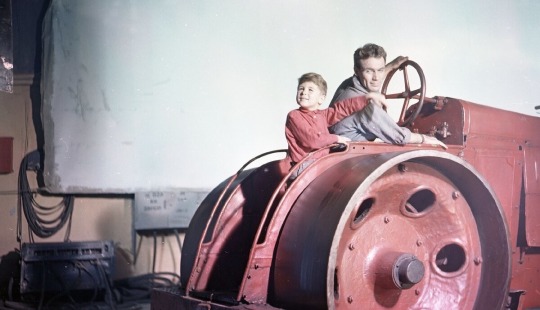
'The Steamroller and the Violin' (1960) Directed by Andrei Tarkovsky © Mosfilm
Global Recognition and First Conflicts With The Authorities
Tarkovsky's first full-length picture was the war drama ‘Ivan’s Childhood.’ Initially, this film – based on the story ‘Ivan’ by Vladimir Bogomolov – was shot by another director. However, Mosfilm Studio found that version “unsatisfactory.” It was particularly criticized for the free treatment of the original text in which the young partisan, Ivan, who was killed at the end of the story, instead survived in the movie and went on to volunteer in the Virgin Lands campaign. This new ending wasn’t approved by Bogomolov and completely contradicted his idea. The writer recalled how he contacted the newspaper which published an article about child partisans with an appeal, “Young heroes, respond!” As Bogomolov found out, no one responded – because no one had survived.
Tarkovsky was given limited time and the remaining budget to shoot his version. He significantly reworked the original text, focusing on the inner world of the child partisan Ivan. Dreams became key to his story. In these dreams, the boy sees his lost mother and lives a happy childhood. In ‘Ivan's Childhood,’ the ‘real world’ doesn’t hold back the dark, repressed desires of the subconscious. On the contrary, this real world is dark and cruel. As film critic Oleg Kovalov writes, the paradox of war is that “the poor child’s striving towards harmony, light, peace, and kindness become an almost shameful desire, a secret perversion.”
‘Ivan's Childhood’ won Tarkovsky the Golden Lion at the Venice Film Festival and brought him worldwide fame. At that time, ‘Thaw cinema’ was popular abroad and often received prizes at international festivals. In 1958, M. Kalatozov's war melodrama ‘The Cranes are Flying’ won the Palme d'Or in Cannes, and in 1961, G. Chukhray's film ‘Ballad of a Soldier’ won the BAFTA Award. Like ‘Ivan's Childhood,’ these movies looked at the war in a new way, moving away from heroic narratives and turning to the stories of its victims.
Tarkovsky's next movie was a medieval drama about the great painter of icons – Andrey Rublev. Despite a deep immersion in the medieval era, the director wasn’t obsessed with accurately reflecting the realities of the 15th century. In Tarkovsky's movie, Rublev, whose biography is practically unknown, is shown as an artist working in the horrible conditions of internecine wars, famine, and surrounding violence. His Rublev is a far cry from the ‘artist inspired by the people’ – the image approved by party officials. Tarkovsky has Rublev go through a loss of faith in people so that he may regain it in the finale after meeting the young bell caster Boriska. In an interview unpublished during his lifetime, Tarkovsky says that “the artist is the conscience of society” and the person who’s most sensitive to changes.
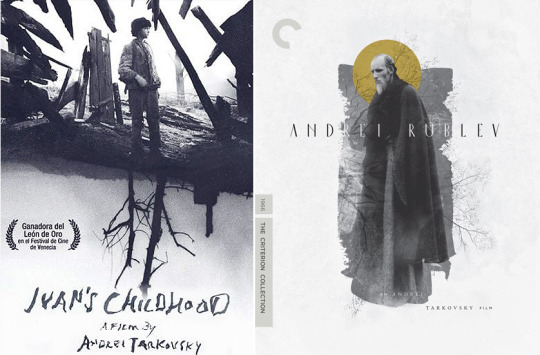
'Ivan's Childhood' (1962); 'Andrei Rublev' (1966) Directed by Andrei Tarkovsky © Mosfilm
During the production of ‘Andrey Rublev,’ a conflict first emerged between Tarkovsky and the Soviet officials who oversaw the studios. The movie was constantly edited, the major scene depicting the Kulikovo Battle didn’t get the required funding (after the film’s release, the press criticized the director for cutting this scene during final edits), and Tarkovsky was accused of excess violence. Eventually, the work was cut by 30 minutes and allowed only limited release three years after it was completed.
Aesthetic Dissident
After two movies focusing on past experiences, the events in Tarkovsky’s next picture unfolded on a space station in the near future. Despite the science fiction genre, ‘Solaris’ – a free adaptation of the novel by Stanislaw Lem (the author wasn’t satisfied with the film and said that Tarkovsky shot ‘Crime and Punishment,’ not ‘Solaris’) – is based on familiar themes: the conflict between reality and fantasy, human memory, and loss of home.
Tarkovsky didn't like genre films and entertainment movies, but science fiction provided a greater sense of allegory than historical events. While filming ‘Solaris’ and ‘Stalker,’ he could explore ideas that interested him while also feeling less pressure from the Communist Party. In her book on Tarkovsky, film critic Maya Turovskaya wrote that Tarkovsky was not a political, but an “aesthetic” dissident, and having minimal outside interference in his work was more important for him than political and economic freedom.
In his next movie, Tarkovsky wanted to explore the phenomenon of memory and to set himself free from the conventions of any genre. Initially, ‘The Mirror’ was planned as an interview film in which the filmmaker’s mother was asked a variety of questions – ranging from her own life to the Vietnam War – while being filmed with a hidden camera. Tarkovsky soon abandoned this idea and made a feature film, but one that was unique in its form.

'Solaris' (1972); 'Mirror' (1975) Directed by Andrei Tarkovsky © Mosfilm
Tarkovsky's co-author, screenwriter Alexander Misharin, remembered the first screening of ‘The Mirror’ by the chairman of the USSR State Committee for Cinematography who remarked, “Surely, we have freedom of creativity. But not to such an extent!” ‘The Mirror’ was in many ways the opposite of the director's previous film. The action descended from space to earth, and instead of a clear plot, it was based on a fragmented narrative imitating human memory where characters and events are layered on top of each other. For example, the main character’s mother and wife are played by one actress, which confuses the viewer and blurs the lines between childhood and recent events.
Instead of a simple, almost non-existent plot, the film is based on visual and thematic ‘rhymes’, which is why ‘The Mirror’ is often called “poetic cinema.” The film is based around the memories of a dying man in whose mind wartime childhood memories blend into the landscapes of Pieter Bruegel the Elder, historical chronicles rhyme with personal experiences, and his mother’s memories intertwine with his own.
By the decision of the State Committee for Cinematography, the film was not widely distributed in the USSR, although it was sent to Cannes. The film’s “unfriendly” exploration of consciousness and memory sealed Tarkovsky's status as an ”aesthetic dissident."
The director’s last movie in the USSR was ‘Stalker’ – a fantastic parable about the journey of the three main characters to a place where secret wishes are fulfilled. The filming process was accompanied by a series of misfortunes: the script was rewritten over ten times, the movie had to be reshot due to a technical issue in which several thousand meters of film were improperly developed and ruined, and Tarkovsky suffered his first heart attack. Stalker acquired the reputation of being a ‘cursed movie’ when, following the premiere, several members of the crew died within a short time, including the director's friend and one of his regular actors, Anatoly Solonitsyn, who played the role of the Writer.
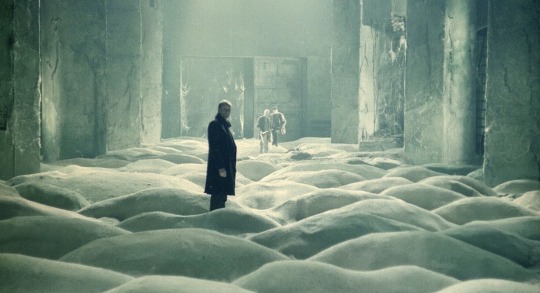
'Stalker' (1979) Directed by Andrei Tarkovsky © Mosfilm
After the futuristic ‘Solaris’ and the experimental ‘Mirror,’ ‘Stalker’ seems almost ascetic. Tarkovsky’s late works increasingly gravitate towards compositional simplicity and limited space – “finding a reflection of infinity in a small space.” For example, the characters in ‘Stalker’ don’t have real names, only nicknames (Stalker, Writer, Professor), and the picture’s post-apocalyptic world is much closer to the stagnant Soviet Union than the ‘city of the future’ from ‘Solaris.’
Conflict With The Authorities
Tarkovsky shot only seven full-length films in his 25 years of filmmaking, but up to the very end of his life, he had many creative plans. One of these was to work on a film in Italy – and in fact, this turned into the movie ‘Nostalgia.’ Tarkovsky waited for permission to start filming for over three years. He finally obtained it with the help of Italian screenwriter Tonino Guerra, who had some influence over Soviet officials. With Guerra, Tarkovsky began writing the script about a man traveling through Italy.
In 1980, Tarkovsky went to Italy to prepare for filming. While there, he had the chance to compare two styles of filmmaking – Soviet and Western. Tarkovsky didn’t have a preference for either and pointed out the shortcomings of each. While capitalist society gave the artist full freedom of expression, it also provided fewer opportunities for making his idea come to fruition.
In many ways, ‘Nostalgia’ anticipated Tarkovsky’s own future fate. The main character is a Russian writer who, like the protagonists of his previous films, travels not so much through Italy as through the realms of his own memory. Tarkovsky reveals the inner experience of emigration where the protagonist is stuck between two worlds, fully belonging to neither of them.
Tarkovsky did not initially plan on permanently leaving the USSR. Despite the fact that he and his wife were allowed to go to Italy, his son and mother had to stay in the USSR. Andrey Tarkovsky Jr. later said that they were left as “hostages” in the Soviet Union to prevent his father from permanently emigrating to the West. What exactly happened remains unknown, but apparently the leadership of the State Committee for Cinematography decided that Tarkovsky had become a so-called “non-returnee” and that he did not plan on coming back to the USSR. His name was banned from print in the USSR, and the Soviets withdrew from the production of ‘Nostalgia.’

'Nostalgia' (1983) Directed by Andrei Tarkovsky © Sovinfilm
Tarkovsky's letters to the general secretaries of the CPSU Central Committee Yuri Andropov and Konstantin Chernenko, in which he asks to work and live in Italy with his family for three years, have been preserved. The filmmaker emphasized that his last picture, ‘Nostalgia,’ was about “homesickness experienced by a Soviet person temporarily finding himself abroad” and that he had no plans to emigrate.
While Tarkovsky worked in the USSR, his relations with censors got progressively worse. At the premiere of ‘Nostalgia’ at the Cannes Film Festival, the Soviets, represented by film director Sergei Bondarchuk, went to great lengths to make sure that Tarkovsky would not receive the main prize. The confrontation ended in an open conflict. In a letter addressed to Secretary General Chernenko, Tarkovsky stated 11 points that demonstrated unfair censorship of his work. Among these were: illegal restrictions on the public release of his films, boycotts by USSR awards committees and film festivals, no press coverage, and the sabotage of ‘Nostalgia’ in Cannes. The betrayal he experienced in Cannes and in his homeland convinced Tarkovsky not to return home. In the summer of 1984, Tarkovsky announced his decision to stay in the West.
Farewell
‘The Sacrifice’ became Tarkovsky's last movie, most of which was filmed in Swedish. Tarkovsky was invited by the Swedish Film Institute, which covered most of the film's expenses. He was a big fan of the great Swedish filmmaker Ingmar Bergman, who lent the Russian director part of his own film crew: Bergman actor Erland Josephson played the leading role, cinematographer Sven Nykvist, who worked with Bergman on all his main films, was the cameraman, and the filmmaker’s son, Daniel Bergman, was his assistant. Moreover, Josephson and Nykvist invested some of their own funds into the film, becoming its co-producers.
By the time filming was over, Tarkovsky was diagnosed with lung cancer. ‘The Sacrifice’ – the story of an aging man who sacrifices his regular life and burns down his house to prevent a nuclear war – is often called ”prophetic." It stands as both the final testament of the dying filmmaker and a prophecy of the Chernobyl disaster that occurred just a few weeks before the premiere.
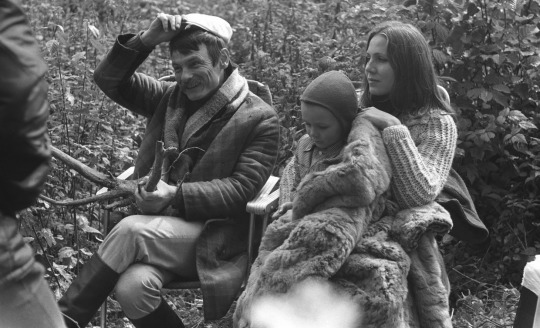
Film director Andrei Tarkovsky on the set of the movie 'Stalker' in 1977. In the picture: Andrei Tarkovsky and Larisa Tarkovskaya. © Global Look Press/Igor Gnevashev/Russian Look
Five years after Tarkovsky’s departure from the USSR, his sixteen-year-old son was allowed to visit his sick father. According to Alexander Gordon, a friend and co-author of Tarkovsky’s early works, party officials knew about Tarkovsky's diagnosis, but for a long time did not disclose it to his family. At that time, Tarkovsky’s previously banned movies were once again released in the Soviet Union.
Tarkovsky died at the end of 1986, at the age of 55. A few days later, the USSR State Committee for Cinematography released an obituary, expressing “bitterness and regret” that the filmmaker had worked away from his homeland in his final years.
Tarkovsky was buried at the Sainte-Geneviève-des-Bois Russian Cemetery near Paris – the final resting place of many Russian émigrés, writers of the Silver Age, and members of the White Movement.
#Renowned | Russian 🇷🇺 | Director | Andrey Tarkovsky#The Father of Modern Arthouse#Soviet Union#Key Filmmaker | Post-War Era#Laid | Foundation#Movie Lovers#Global Recognition#Conflicts#Authorities#War | Home | First Films#Aesthetic Dissident#Farewell
3 notes
·
View notes
Photo

Recommendation of the week: Izgnanie (The Banishment) (2007)
Dir.: Andrey Zvyagintsev
Cast: Konstantin Lavronenko, Maria Bonnevie, Alexander Baluev, Dmitriy Ulyanov, Vitaly Kishchenko.
Genre: Drama
Plot: A trip to the pastoral countryside reveals a dark, sinister reality for a family from the city.
Filmphilics score: 7'5/10
#izgnanie#the banishment#andrey zvyagintsev#konstantin lavronenko#maria bonnevie#alexander baluev#dmitry ulyanov#vitaly kishchenko#drama#drama movies#drama film#cult film#cult movies#cult cinema#cinema#film#movie
6 notes
·
View notes
Text
Favourite films watched in 2020
In no particular order:
Katalin Varga (Peter Strickland, 2009) The Gleaners and I (Les Glaneurs et la glaneuse, Agnès Varda, 2000) Land of Silence and Darkness (Land des Schweigens und der Dunkelheit, Werner Herzog, 1971) Post Tenebras Lux (Carlos Reygadas, 2012) The Return (Возвращение, Andrey Zvyaginstev, 2003) The Grand Bizarre (Jodie Mack, 2018) Transnistra (Anna Eborn, 2019) Ghost Town Anthology (Répertoire des villes disparues, Denis Côté, 2019) The Petrified Forest (Archie Mayo, 1936) Viy (В��й, Georgiy Kropachyov & Konstantin Ershov, 1967)
Complete list of all 323 films watched in 2020 under the cut!
January
Angus, Thongs and Perfect Snogging (Gurinder Chadha, 2008) Blade (Steven Norrington, 1998) Who Among Us! (Abhishek Prasad and Rebecca Kahn, 2019) Brotherhood (Meryam Joobeur, 2018) Disctrict 9 (Neill Blomkamp, 2009) Hair Love (Matthew A. Cherry and Karen Rupert Toliver, 2019) Kitbull (Rosana Sullivan, 2019) Sister (妹妹, Siqi Song, 2019) Nuts! (Penny Lane, 2016) The Judge (Erika Cohn, 2017) The Ghosts of Sugar Land (Bassam Tariq, 2019) Amazonia (Dominic Hicks, 2018) Dearborn Ash (Hena Ashraf, 2018) Pineal (Jenny Rinta-Kanto, 2019) Headcleaner (Nick Scott, 2019) Rattlesnake (Zak Hilditch, 2019) The Neon Demon (Nicolas Winding Refn, 2016) Skin (Audrey Rosenberg, 2018) The Banishment (Изгнание, Andrey Zvyagintsev, 2007) F is for Friendship (Shaya Mulcahy, 2016) Paradise Hills (Alice Waddington, 2019) Road House (Rowdy Herrington, 1989) Hustlers (Lorene Scafaria, 2019) I Believe in Unicorns (Leah Meyerhoff, 2014) Ghost Train (Lee Cronin, 2014) Troop Zero (Bert & Bertie, 2019) For the Love of God (Pour l'Amour de Dieu, Micheline Lanctôt, 2011)
February
Sitting Next to Zoe (Ivana Lalović, 2013) Dark Places (Gilles Paquet-Brenner, 2015) Nocturnal Animals (Tom Ford, 2016) The Limey (Steven Soderbergh, 1999) Side Effects (Steven Soderbergh, 2013) Good Sam (Kate Melville, 2019) Anima (Paul Thomas Anderson, 2019) What Did Jack Do? (David Lynch, 2017) Fleur de tonnerre (Stéphanie Pillonca, 2016) Parasite (Bong Joon-ho, 2019) The Field Guide to Evil (Peter Strickland, Veronika Franz & Severin Fiala, Katrin Gebbe, Yannis Veslemes, Ashim Ahluwalia, Agnieszka Smoczynska, Can Evrenol, Calvin Reeder, 2018) Devil (John Eric Dowdle, 2010) 37 Seconds (Hikari, 2019) The Falling (Carol Morley, 2014) Grave of the Fireflies (火垂るの墓, Hotaru no Haka, Isao Takahata, 1988) Elena (Елена, Andrey Zvyagintsev, 2011) The Lighthouse (Robert Eggers, 2019) Baskin (Can Evrenol, 2015) In Fabric (Peter Strickland, 2018) Leviathan (Левиафан, Andrey Zvyagintsev, 2014) Suffragette (Sarah Gavron, 2015)
March
The East (Zal Batmanglij, 2013) Solaris (Солярис, Andrei Tarkovsky, 1972) Mamma Mia! (Phyllida Lloyd, 2008) There Will Be Blood (Paul Thomas Anderson, 2007) Io (Jonathan Helpert, 2019) The Death and Life of Marsha P. Johnson (David France, 2017) A Bump Along the Way (Shelly Love, 2019) Color Out of Space (Richard Stanley, 2019) Divines (Houda Benyamina, 2016) Vanishing Waves (Kristina Buožytė, 2012) Mirror (Зеркало, Andrei Tarkovsky, 1975) Zama (Lucrecia Martel, 2017) Swallow (Carlo Mirabella-Davis, 2019) Joy (Sudabeh Mortezai, 2018) Good Time (Josh and Benny Safdie, 2017) Quarantine (John Eric Dowdle, 2008) The Reflecting Skin (Philip Ridley, 1990) Three Billboards Outside Ebbing, Missouri (Martin McDonagh, 2017) Leto (Лето, Kirill Serebrennikov, 2018) The 39 Steps (Alfred Hitchcock, 1935)
April
Queen of Earth (Alex Ross Perry, 2015) Black Christmas (Sophia Takal, 2019) Dogs of Chernobyl (Léa Camilleri & Hugo Chesnel, 2020) Firecrackers (Jasmin Mozaffari, 2018) Les Misérables (Ladj Ly, 2019) The Evil Dead (Sam Raimi, 1981) The Daughters of Fire (Las hijas del fuego, Albertina Carri, 2018) The Fallen Idol (Carol Reed, 1948) The Wailing (곡성, Gokseong, Na Hong-jin, 2016) Inherent Vice (Paul Thomas Anderson, 2014) Sorrowful Shadow (Guy Maddin, 2004) Mistery Lonely (Harmony Korine, 2007) The Grand Bizarre (Jodie Mack, 2018) Zombieland: Double Tap (Ruben Fleischer, 2019) Waves '98 (Ely Dagher, 2015) Uncut Gems (Josh and Benny Safdie, 2019) The Last Séance (Laura Kulik, 2018) Too Late to Die Young (Tarde para morir joven, Dominga Sotomayor Castillo, 2018) Room (Lenny Abrahamson, 2015) Queen & Slim (Melina Matsoukas, 2019) The Holy Mountain (La montaña sagrada, Alejandro Jodorowsky, 1973) The Chaser ( 추격자, Chugyeokja, Na Hong-jin, 2008) Made in Dagenham (Nigel Cole, 2010) The Color of Pomegranates (Նռան գույնը, Nřan guynə, Sergei Parajanov, 1969) Lost Girls (Liz Garbus, 2020) Ghost Town Anthology (Répertoire des villes disparues, Denis Côté, 2019) And Then There Were None (René Clair, 1945) Doctor Sleep (Mike Flanagan, 2019) Meshes of the Afternoon (Maya Deren and Alexander Hammid, 1943) Circus of Books (Rachel Mason, 2019) Catfish (Henry Joost and Ariel Schulman, 2010) Wildling (Fritz Böhm, 2018) Delphine (Chloé Robichaud, 2019) The Strange Love of Martha Ivers (Lewis Milestone, 1946) The Red Balloon (Le Ballon rouge, Albert Lamorisse, 1956) Nona. If They Soak Me, I’ll Burn Them (Nona. Si me mojan, yo los quemo, Camila José Donoso, 2019) The Lodge (Veronika Franz & Severin Fiala, 2019) Invisible Man (Leigh Whannell, 2020) Sans Soleil (Chris Marker, 1983)
May
A Russian Youth (Мальчик русский, Alexander Zolotukhin, 2019) Sicario (Denis Villeneuve, 2015) Fedora (Billy Wilder, 1978) LoveTrue (Alma Har'el, 2016) The Platform (Galder Gaztelu-Urrutia, 2019) Water Lilies (Naissance des pieuvres, Céline Sciamma, 2007) The Assistant (Kitty Green, 2019) The Half of It (Alice Wu, 2020) Tomboy (Céline Sciamma, 2011) The Last Man on Earth (Ubaldo Ragona and Sidney Salkow, 1964) Beanpole (Дылда, Kantemir Balagov, 2019) Mommy (Xavier Dolan, 2014) The Fall (Jonathan Glazer, 2020) Girlhood (Bande de filles, Céline Sciamma, 2014) Carnival of Souls (Herk Harvey, 1962) Marguerite & Julien (Valérie Donzelli, 2015) Portrait of a Lady on Fire (Portrait de la jeune fille en feu, Céline Sciamma, 2019) This Magnificent Cake! (Ce Magnifique Gâteau!, Emma De Swaef & Marc James Roels, 2018) Romantic Comedy (Elizabeth Sankey, 2019) Transnistra (Anna Eborn, 2019) Eraserhhead (David Lynch, 1977) The Farewell (Lulu Wang, 2019) Emma. (Autumn de Wilde, 2020) Late Night (Nisha Ganatra, 2019) Charlie's Angels (Elizabeth Banks, 2019) Birds of Prey (and the Fantabulous Emancipation of One Harley Quinn) (Cathy Yan, 2020) The Ancestors Came (Cecile Emeke, 2017) Suicide by Sunlight (Nikyatu Jusu, 2019) Anthropocene: The Human Epoch (Edward Burtynsky, Jennifer Baichwal, Nicholas de Pencier, 2018) A Perfect 14 (Giovanna Morales Vargas, 2018) Westwood: Punk, Icon, Activist (Lorna Tucker, 2018) Free Radicals (Len Lye, 1958) Aniara (Pella Kågerman and Hugo Lilja, 2018) Vivarium (Lorcan Finnegan, 2019) La Pointe-Courte (Agnès Varda, 1955) Diary of a Pregnant Woman (L'Opéra-Mouffe, Agnès Varda, 1958) Salut les Cubains (Agnès Varda, 1964) Uncle Yanco (Oncle Yanco, Agnès Varda, 1967) GUO4 (Peter Strickland, 2019) Atlantiques (Mati Diop, 2009) Sitara: Let Girls Dream (Sharmeen Obaid-Chinoy, 2019) Lions Love (Lions Love... And Lies, Agnès Varda, 1969) Živan Makes a Punk Festival (Živan pravi pank festival, Ognjen Glavonić, 2014) Plastic and Glass (Tessa Joosse, 2009) The So-Called Caryatids (Les Dites Cariatides, Agnès Varda, 1984) The Octopus (La Pieuvre, Jean Painlevé, 1928) Hyas and Stenorhynchus (Hyas et sténorinques, crustacés marins, Jean Painlevé, 1929) Sea Urchins (Les Oursins, Jean Painlevé, 1929) Bernard-L'Hermite (Bernard-l'Ermite, Jean Painlevé, 1930) The Sea Horse (L'Hippocampe ou "cheval marin", Jean Painlevé, 1934) Voyage to the Sky (Voyage dans le ciel, Jean Painlevé, 1937) Le Vampire (Jean Painlevé, 1945) Freshwater Assassins (Assassins d'eau douce, Jean Painlevé, 1947) How Some Jellyfish Are Born (Comment naissent des méduses, Jean Painlevé and Geneviève Hamon, 1960) Shrimp Stories (Histoires de crevettes, Jean Painlevé and Geneviève Hamon, 1964) The Love Life of the Octopus (Les Amours de la pieuvre, Jean Painlevé and Geneviève Hamon, 1965) Acera, or The Witches' Dance (Acera, ou le Bal des Sorcières, Jean Painlevé and Geneviève Hamon, 1972) Pigeons of the Square (Les Pigeons du square, Jean Painlevé, 1982) The Slumber Party Massacre (Amy Holden Jones, 1982) Jane B. par Agnès V. (Agnès Varda, 1988) The Cranes Are Flying (Летят журавли, Mikhail Kalatozov, 1957) Crystal Swan (Хрусталь, Darya Zhuk, 2018) Take Me Somewhere Nice (Ena Sendijarević, 2019) Microhabitat ( 소공녀, Jeon Go-woon, 2017) The Unforeseen (Laura Dunn, 2007)
June
Funny Games (Michael Haneke, 1997) Louise Bourgeois: The Spider, the Mistress and the Tangerine (Marion Cajori and Amei Wallach, 2008) Wodaabe: Herdsmen of the Sun (Werner Herzog, 1989) Bells from the Deep: Faith and Superstition in Russia (Glocken aus der Tiefe - Glaube und Aberglaube in Russland, Werner Herzog, 1993) We Are the Best! (Vi är bäst!, Lukas Moodysson, 2013) Olla (Ariane Labed, 2019) Return to Reason (Le Retour à la raison, Man Ray, 1923) Ghosts Before Breakfast (Vormittagsspuk, Hans Richter, 1928) Sissy Boy Slap Party (Guy Maddin, 2004) The Republic of Enchanters (La République des enchanteurs, Fanny Liatard and Jérémy Trouilh, 2016) Sullivan's Banks (Sullivans Banken, Heinz Emigholz, 2000) Black Panthers (Agnès Varda, 1970) Asparagus (Suzan Pitt, 1979) America (Valérie Massadian, 2013) The Fall (Tarsem Singh, 2006) The Watermelon Woman (Cheryl Dunye, 1996) Douce Menace (Ludovic Habas, Yoan Sender, Margaux Vaxelaire, Mickaël Krebs, Florent Rousseau, 2011) Curling (Denis Côté, 2010) Trouble Every Day (Claire Denis, 2001) The Return (Возвращение, Andrey Zvyaginstev, 2003) Maillart's Bridges (Maillarts Brücken, Heinz Emigholz, 2000) Two Years at Sea (Ben Rivers, 2011) The Creeping Garden (Tim Grabham and Jasper Sharp, 2014) Homo Sapiens (Nikolaus Geyrhalter, 2016) A Radiant Life (Une Vie radieuse, Meryll Hardt, 2013) Shirley (Josephine Decker, 2020) Disclosure (Sam Feder, 2020) Baghead (Mark Duplass and Jay Duplass, 2008) Lahemaa (Leslie Lagier, 2010) Closeness (Теснота, Kantemir Balagov, 2017) Touki Bouki (Djibril Diop Mambéty, 1973) Daughter (Dcera, Daria Kashcheeva, 2019) Human Nature (Sverre Fredriksen, 2019) 1 Dimension (一维, Lü Yue, 2013)
July
Post Tenebras Lux (Carlos Reygadas, 2012) Something to Remember (Något Att Minnas, Niki Lindroth Von Bahr, 2019) Gegenüber (Ewa Wikiel, 2019) The Claudia Kishi Club (Sue Ding, 2020) Villa Empain (Katharina Kastner, 2019) Fata Morgana (Werner Herzog, 1971) Some Like It Hot (Billy Wilder,1959) Breakwater (Quebramar, Cris Lyra, 2019) Y a-t-il une vierge encore vivante? (Bertrand Mandico, 2015) Virus Tropical (Santiago Caicedo, 2017) The Tribe (Племя, Miroslav Slaboshpitsky, 2014) Integration Report 1 (Madeline Anderson, 1960) Tribute to Malcolm X (Madeline Anderson, 1967)
August
The Stopover (Voir du pays, Delphine and Muriel Coulin, 2016) Our Time (Nuestro Tiempo, Carlos Reygadas, 2018) Never Rarely Sometimes Always (Eliza Hittman, 2020) Land of Silence and Darkness (Land des Schweigens und der Dunkelheit, Werner Herzog, 1971) Continental, a Film Without Guns (Continental, un film sans fusil, Stéphane Lafleur, 2007) Spaceship Earth (Matt Wolf, 2020) The Go-Go's (Alison Ellwood, 2020) First Cow (Kelly Reichardt, 2019) Light of My Life (Casey Affleck, 2019) Wadjda (Haifaa al-Mansour, 2012) Spinster (Andrea Dorfman, 2020) Love and Anarchy (Film d'amore e d'anarchia, ovvero: stamattina alle 10, in via dei Fiori, nella nota casa di tolleranza..., Lina Wertmüller, 1973) Shapito Show (Шапито шоу, Sergey Loban, 2011) Charade (Stanley Donen, 1693) Cat People (Jacques Tourneur, 1942) Radioactive (Marjane Satrapi, 2019) Tabloid (Errol Morris, 2010) The Mourning Forest ( 殯の森, Mogari No Mori, Naomi Kawase, 2007) Lilya 4-ever (Lilja 4-ever, Lukas Moodysson, 2002)
September
The Nightingale (Jennifer Kent, 2018) Babyteeth (Shannon Murphy, 2019) Let the Corpses Tan (Laissez bronzer les cadavres, Hélène Cattet & Bruno Forzani, 2017) Wings of Desire (Der Himmel über Berlin, Wim Wenders, 1987) In My Room (Mati Diop, 2020) Katalin Varga (Peter Strickland, 2009) Les 3 Boutons (Agnès Varda, 2015) Somebody (Miranda July, 2014) Öndög (Wang Quan'an, 2019) Strasbourg 1518 (Jonathan Glazer, 2020) Mermaid (Русалка, Anna Melikyan, 2007) The Lighthouse (Маяк, Maria Saakyan, 2006) Phenomena (Dario Argento, 1985) That One Day (Crystal Moselle, 2016) Brigitte (Lynne Ramsay, 2019) The Wedding Singer's Daughter (Haifaa al-Mansour, 2018) Shako Mako (Hailey Gates, 2019) Carmen (Chloë Sevigny, 2017) The Summer of Sangailė (Sangailės Vasara, Alanté Kavaïté, 2015) Hello Apartment (Dakota Fanning, 2018) Seed (Naomi Kawase, 2016) Beyond the Visible: Hilma af Klint (Halina Dyrschka, 2019) Matthias & Maxime (Xavier Dolan, 2019) The Gleaners and I (Les Glaneurs et la glaneuse, Agnès Varda, 2000)
October
American Murder (Jenny Popplewell, 2020) Hereditary (Ari Aster, 2018) Ghostland (Pascal Laugier, 2018) Triangle (Christopher Smith, 2009) The Amityville Horror (Stuart Rosenberg, 1979) The Visit (M. Night Shyamalan, 2015) The House of the Devil (Ti West, 2009) Misery (Rob Reiner, 1990) The Exorcist (William Friedkin, 1973) Coherence (James Ward Byrkit, 2013) Metamorphosis (변신, Kim Hong-sun, 2019) Errementari (Paul Urkijo Alijo, 2017) I Am a Ghost (H.P. Mendoza,2012) The Changeling (Peter Medak, 1980) Witching and Bitching (Las Brujas de Zugarramurdi, Álex de la Iglesia, 2013) Thirst (박쥐, Park Chan-wook, 2009) V/H/S ( Adam Wingard, David Bruckner, Ti West, Glenn McQuaid, Joe Swanberg, Radio Silence, 2012) The Autopsy of Jane Doe (André Øvredal, 2016) Overlord (Julius Avery, 2018) Häxan (Benjamin Christensen, 1922) Viy (Вий, Georgiy Kropachyov & Konstantin Ershov, 1967) Amulet (Romola Garai, 2020) A Bucket of Blood (Roger Corman, 1959) The Wasp Woman (Roger Corman, 1959) Mother! (Darren Aronofsky, 2017) Suspiria (Dario Argento, 1977) The Open House (Matt Angel, Suzanne Coote, 2018)
November
The Damned Don't Cry (Vincent Sherman, 1950) Notorious (Alfred Hitchcock, 1946) While the City Sleeps (Fritz Lang, 1956) The Man Who Wasn't There (Joel Coen, 2001) The Naked City (Jules Dassin, 1948) The Petrified Forest (Archie Mayo, 1936) Croupier (Mike Hodges, 1998) In a Lonely Place (Nicholas Ray, 1950) Elevator to the Gallows (Ascenseur pour l'échafaud, Louis Malle, 1958) Key Largo (John Huston, 1948) Dial M for Murder (Alfred Hitchcock, 1954) The Long Farewell (Долгие проводы, Kira Muratova, 1971) The Killers (Robert Siodmak, 1946) Gun Crazy (Joseph H. Lewis, 1950) Alphaville (Jean-Luc Godard, 1965) Laura (Otto Preminger, 1944) The Third Man (Carol Reed, 1949) Dark City (Alex Proyas, 1998) Night and the City (Jules Dassin, 1950) Ace in the Hole (Billy Wilder, 1951)
December
Nimic (Yorgos Lanthimos, 2020) Elsa la rose (Agnès Varda, 1966) Le Bonheur (Agnès Varda, 1965) Little Girl (Petite Fille, Sébastien Lifshitz, 2020) Cold Meridian (Peter Strickland, 2020) The Fiancés of the Bridge Mac Donald (Les Fiancés du Pont Mac Donald ou (Méfiez-vous des Lunettes Noires)) (Agnès Varda, 1961) Along the Coast (Du côté de la côte, Agnès Varda, 1958) Vic + Flo Saw a Bear (Vic + Flo ont vu un ours, Denis Côté, 2013) Zootopia (Byron Howard, Rich Moore, 2016) It's a Wonderful Life (Frank Capra, 1946) Paddington (Paul King, 2014) Miracle on 34th Street (George Seaton, 1947) High Life (Claire Denis, 2018) Paddington 2 (Paul King, 2017)
19 notes
·
View notes
Text
CATÁLOGO DE PELÍCULAS
ROY ANDERSSON
• Songs from the Second Floor (2000)
MICHELANGELO ANTONIONI
• The Incomunication Trilogy:
o L’avventura (1960) o La Notte (1961) o L’eclisse (1962)
• Il Deserto Rosso (1964)
• Blow-Up (1966)
• Professione, Reporter (1975)
DARIO ARGENTO
• Profondo Rosso (1975)
• Suspiria (1977)
RALPH BAKSHI
• Fritz The Cat (1972)
• Heavy Traffic (1973)
• Coonskin (1975)
• The Lord Of The Rings (1978)
• Wizards (1977)
INGMAR BERGMAN
• Wild Strawberries (1957)
• God’s Silence Trilogy:
o Through a Glass Darkly (1961) o The Silence (1963) o Winter Light (1963)
• All These Women (1964)
• Persona (1966)
• Hour Of The Wolf (1968)
• Shame (1968)
• En Passion (1969)
• Cries And Whispers (1972)
• Scenes From a Marriage [serie, todos los capítulos] (1973)
• Autumn Sonata (1978)
• Fanny And Alexander (1982)
• Saraband (2003)
BERTRAND BLIER
• Too Beautiful For You (1989)
ROBERT BRESSON
• Au Hasard Balthazar (1966)
• Mouchette (1967)
• L’Argent (1983)
LUIS BUÑUEL
• Viridiana (1961)
• El Ángel Exterminador (1962)
• The Discreet Charm of the Bourgeoisie (1972)
LEÓS CARAX
• Holy Motors (2012)
ALEX DE LA IGLESIA
• El Día de la Bestia (1995)
CARL THEODOR DREYER
• Ordet (1955)
• Gertrud (1964)
ROBERT EGGERS
• The Lighthouse (2019)
VÍCTOR ERICE
• El Espíritu de la Colmena (1973)
• El Sur (1983)
• El Sol del Membrilo (1992)
FEDERICO FELLINI
• La Strada (1954)
• La Dolce Vita (1960)
• 8 ½ (1963)
• Satyricon (1969)
• Roma (1972)
TODD FIELD
• Little Children (2006)
TERRY GILLIAM
• Brazil (1985)
• Fear and Loathing in Las Vegas (1998)
JEAN-LUC GODARD
• About the Suffle (1960)
• Une Femme Est Une Femme (1961)
• Vivire Sa Vie (1962)
LUCA GUADAGNINO
• Call Me By Your Name (2017)
• Suspiria (2018)
WERNER HERZOG
• Aguirre: La Ira de Dios (1972)
ALFRED HITCHCOCK
• Notorious (1946)
ALEJANDRO GONZÁLEZ IÑÁRRITU
• The Revenant (2015)
ALAIN JESSUA
• La Vie a L'envers (1964)
JEAN-PIERRE JEUNET
• Delicatessen (1991)
ALEJANDRO JODOROWSKY
• The Holy Mountain (1973)
• El Topo (1991)
• La Danza de la Realidad (2013)
• Endless Poetry (2016)
BONG JOON-HO
• Parasite (2019)
WONG KAR-WAI
• Days Of Being Wild (1990)
• Chungking Express (1994)
• Fallen Angels (1995)
• In The Mood Of Love (2000)
• 2046 – Los Secretos del Amor (2004)
KENJI MIZOGUCHI
• Sansho Dayu (1954)
• The Life of Oharu (1952)
KRZYSZTOF KIEŚLOWSKI
• No End (1985)
• Blind Chance (1987)
• A Short Film About Killing (1988)
• A Short Film About Love (1988)
• Dekalog [serie de películas, completa] (1989)
• The Double Life of Véronique (1991)
• Three Colours Trilogy:
o Blue (1993) o Red (1994) o White (1994)
ELEM KLÍMOV
• Come and See (1985)
STANLEY KUBRICK
• Barry Lyndon (1975)
• Full Metal Jacket (1987)
AKIRA KUROSAWA
• Dreams (1990)
EMIR KUSTURICA
• Time of the Gypsies (1988)
• Underground (1995)
JOHN LANDIS
• The Blues Brothers (1980)
CLAUDE LELOUCH
• Un Homme et Une Femme (1966)
DAVID LYNCH
• Eraserhead (1977)
• Twin Peaks: Fire Walk With Me (1992)
• Lost Highway (1997)
• Mulholland Drive (2001)
TERRENCE MALICK
• The New World (2005)
GASPAR NOÉ
• Enter The Void (2009)
NOBUHIKO OBAYASHI
• Hausu (1977)
PIER PAOLO PASOLINI
• Teorema (1968)
PAWEŁ PAWLIKOWSKI
• Ida (2013)
• Cold War (2018)
ELIO PETRI
• The Assassination of a Citizen Above Suspicion (1970)
• The Working Class Goes to Heaven (1971)
CHRISTIAN PETZOLD
• Barbara (2012)
• Transit (2018)
ROMAN POLANSKI
• Repulsion (1965)
ROB REINER
• Stand By Me (1986)
NICOLAS ROEG
• The Man Who Fell to Earth (1976)
JULIAN SCHNABEL
• The Diving Bell and the Butterfly (2007)
• At Eternity´s Gate (2018)
LARISA SHEPITKO
• The Ascent (1977)
WHIT STILLMAN
• Metropolitan (1990)
ANDRÉI TARKOVSKY
• Ivan's Childhood (1962)
• Andrei Rublev (1966)
• The mirror (1975)
• Stalker (1979)
• Nostalghia (1983)
• The sacrifice (1986)
BELA TARR
• Almanac of Fall (1984)
• Damnation (1987)
• Sátántangó (1994)
• Werckmeister Harmóniák (2000)
• The Man from London (2007)
• The Turin Horse (2011)
JACQUES TATI
• Playtime (1967)
LUCHINO VISCONTI
• La Tierra Tiembla (1948)
• Noches Blancas (1957)
• Rocco y sus Hermanos (1960)
• Il Gatopardo (1963)
• La Caída de los Dioses (1969)
• Muerte en Venecia (1971)
• Ludwig II (1973)
ORSON WELLES
• Citizen Kane (1941)
YASUJIRO OZU
• Tokyo Story (1953)
• Early Spring (1956)
ANDREY ZVYAGINTSEV
• The Return (2003)
• The Banishment (2007)
• Elena (2011)
• Leviathan (2014)
• Loveless (2017)
#catálogo#cine#cine arte#arte#antonioni#tarkovski#welles#visconti#david lynch#polanski#buñuel#kubrick#bergman#peliculas#film#films#cortometraje#largometraje#cineclub#videoclub#autocinema#cinema
22 notes
·
View notes
Text
1861 Georges Méliès 1875 D.W. Griffith 1879 Victor Sjöström 1880 Tod Browning 1881 Cecil B. DeMille 1884 Robert Flaherty 1885 Allan Dwan / Sacha Guitry / G.W. Pabst / Erich von Stroheim 1886 Michael Curtiz / Henry King / John Cromwell 1887 Raoul Walsh 1888 F.W. Murnau 1889 Charles Chaplin / Jean Cocteau / Carl Theodor Dreyer / Victor Fleming / Abel Gance / James Whale 1890 Clarence Brown / Fritz Lang 1892 Ernst Lubitsch 1893 William Dieterle 1894 Frank Borzage / John Ford / Jean Renoir / King Vidor / Josef von Sternberg 1895 Buster Keaton 1896 Julien Duvivier / Howard Hawks / Leo McCarey / Dziga Vertov / William Wellman 1897 Frank Capra / Douglas Sirk 1898 René Clair / Sergei Eisenstein / Henry Hathaway / Mitchell Leisen / Kenji Mizoguchi / Preston Sturges 1899 George Cukor / Alfred Hitchcock 1900 Luis Buñuel / Mervyn LeRoy / Robert Siodmak 1901 Robert Bresson / Vittorio De Sica 1902 Emeric Pressburger / Max Ophüls / William Wyler 1903 Vincente Minnelli / Yasujiro Ozu 1904 Delmer Daves / Terence Fisher / George Stevens / Jacques Tourneur / Edgar G. Ulmer 1905 Mikio Naruse / Michael Powell / Otto Preminger / Jean Vigo 1906 Jacques Becker / Marcel Carné / John Huston / Anthony Mann / Carol Reed / Roberto Rossellini / Luchino Visconti / Billy Wilder 1907 Henri-Georges Clouzot / Joseph H. Lewis / Jacques Tati / Fred Zinnemann 1908 Tex Avery / Edward Dmytryk / Phil Karlson / David Lean / Manoel de Oliveira 1909 Elia Kazan / Joseph Losey / Joseph L. Mankiewicz 1910 John Sturges / Akira Kurosawa 1911 Jules Dassin / Nicholas Ray 1912 Michelangelo Antonioni / Samuel Fuller / Gene Kelly / Alexander Mackendrick / Don Siegel 1913 André de Toth / Mark Robson / Frank Tashlin 1914 Mario Bava / William Castle / Robert Wise 1915 Orson Welles 1916 Budd Boetticher / Richard Fleischer / George Sidney 1917 Maya Deren / Jean-Pierre Melville 1918 Robert Aldrich / Ingmar Bergman 1920 Federico Fellini / Eric Rohmer 1921 Luis García Berlanga / Miklós Jancsó / Chris Marker / Satyajit Ray 1922 Blake Edwards / Jonas Mekas / Pier Paolo Pasolini / Arthur Penn / Alain Resnais 1923 Ousmane Sembene / Seijun Suzuki 1924 Stanley Donen / Sidney Lumet 1925 Robert Altman / Claude Lanzmann / Sam Peckinpah / Maurice Pialat 1926 Roger Corman / Shohei Imamura / Jerry Lewis / Andrzej Wajda 1927 Kenneth Anger / Ken Russell 1928 Stanley Kubrick / Jacques Rivette / Nicolas Roeg / Agnès Varda / Andy Warhol 1929 Hal Ashby / John Cassavetes / Alejandro Jodorowsky / Sergio Leone 1930 Claude Chabrol / Clint Eastwood / John Frankenheimer / Kinji Fukasaku / Jean-Luc Godard / Frederick Wiseman 1931 Jacques Demy / Mike Nichols / Ermanno Olmi 1932 Milos Forman / Monte Hellman / Louis Malle / Nagisa Oshima / Carlos Saura / Andrei Tarkovsky / François Truffaut 1933 John Boorman / Stan Brakhage / Roman Polanski / Bob Rafelson / Jean-Marie Straub 1934 Sydney Pollack 1935 Woody Allen / Theo Angelopoulos 1936 Hollis Frampton / Danièle Huillet / Ken Loach 1937 Ridley Scott 1938 Paul Verhoeven 1939 Peter Bogdanovich / Francis Ford Coppola / William Friedkin / Glauber Rocha 1940 Dario Argento / Brian De Palma / Victor Erice / Terry Gilliam / Abbas Kiarostami / George A. Romero 1941 Bernardo Bertolucci / Stephen Frears / Patricio Guzmán / Krzysztof Kieslowski / Hayao Miyazaki / Raúl Ruiz / Bertrand Tavernier 1942 Peter Greenaway / Michael Haneke / Werner Herzog / Walter Hill / Martin Scorsese 1943 Roy Andersson / David Cronenberg / Mike Leigh / Terrence Malick / Michael Mann / Alan Rudolph 1944 Charles Burnett / Jonathan Demme / George Lucas / Peter Weir 1945 Terence Davies / Rainer Werner Fassbinder / George Miller / Wim Wenders 1946 Joe Dante / Claire Denis / David Lynch / Paul Schrader / Oliver Stone / John Woo 1947 Hou Hsiao-hsien / Takeshi Kitano / Rob Reiner / Steven Spielberg / Edward Yang 1948 John Carpenter / Philippe Garrel / Errol Morris 1949 Pedro Almodóvar 1950 Chantal Akerman / John Landis / John Sayles 1951 Kathryn Bigelow / Jean-Pierre Dardenne / Abel Ferrara / Aleksandr Sokurov / Robert Zemeckis / Zhang Yimou 1952 Jacques Audiard / Gus Van Sant 1953 Jim Jarmusch 1954 James Cameron / Jane Campion / Joel Coen / Luc Dardenne / Ang Lee / Michael Moore 1955 Olivier Assayas / Béla Tarr / Johnnie To 1956 Danny Boyle / Guy Maddin / Lars von Trier / Wong Kar-wai 1957 Ethan Coen / Aki Kaurismäki / Spike Lee / Mohsen Makhmalbaf / Tsai Ming-liang 1958 Tim Burton 1959 Nuri Bilge Ceylan / Pedro Costa / Sam Raimi 1960 Leos Carax / Atom Egoyan / Hong Sang-soo / Richard Linklater / Takashi Miike / Jafar Panahi 1961 Alfonso Cuarón / Todd Haynes / Peter Jackson / Alexander Payne / Abderrahmane Sissako / Michael Winterbottom 1962 David Fincher / Hirokazu Koreeda / Kenneth Lonergan 1963 Michel Gondry / Alejandro González Iñárritu / Park Chan-wook / Steven Soderbergh / Quentin Tarantino 1964 Guillermo del Toro / Kelly Reichardt / Andrey Zvyagintsev 1965 Jonathan Glazer 1966 Lucrecia Martel 1967 Denis Villeneuve 1969 Wes Anderson / Darren Aronofsky / Noah Baumbach / Bong Joon-ho / James Gray / Spike Jonze / Steve McQueen / Lynne Ramsay 1970 Paul Thomas Anderson / Jia Zhangke / Christopher Nolan / Apichatpong Weerasethakul 1971 Sofia Coppola / Carlos Reygadas Directors listed by key production country (Country of birth, if it differs, is listed in brackets) Argentina Lucrecia Martel Australia Jane Campion (New Zealand) / George Miller Austria Michael Haneke (Germany) Belgium Chantal Akerman / Jean-Pierre Dardenne & Luc Dardenne Brazil Glauber Rocha Canada David Cronenberg / Atom Egoyan (Egypt) / Guy Maddin / Denis Villeneuve China Jia Zhangke / Zhang Yimou Denmark Carl Theodor Dreyer / Lars von Trier Finland Aki Kaurismäki France Olivier Assayas / Jacques Audiard / Jacques Becker / Robert Bresson / Leos Carax / Marcel Carné / Claude Chabrol / René Clair / Henri-Georges Clouzot / Jean Cocteau / Jacques Demy / Claire Denis / Julien Duvivier / Abel Gance / Philippe Garrel / Jean-Luc Godard / Sacha Guitry (Russia) / Patricio Guzmán (Chile) / Claude Lanzmann / Louis Malle / Chris Marker / Georges Méliès / Jean-Pierre Melville / Max Ophüls (Germany) / Maurice Pialat / Roman Polanski / Jean Renoir / Alain Resnais / Jacques Rivette / Eric Rohmer / Raúl Ruiz (Chile) / Jean-Marie Straub & Danièle Huillet / Jacques Tati / Bertrand Tavernier / François Truffaut / Agnès Varda (Belgium) / Jean Vigo Germany / West Germany Rainer Werner Fassbinder / Werner Herzog / F.W. Murnau / G.W. Pabst (Austria-Hungary) / Wim Wenders Greece Theo Angelopoulos Hong Kong Wong Kar-wai (China) / Johnnie To / John Woo (China) Hungary Miklós Jancsó / Béla Tarr India Satyajit Ray Iran Abbas Kiarostami / Mohsen Makhmalbaf / Jafar Panahi Italy Michelangelo Antonioni / Dario Argento / Mario Bava / Bernardo Bertolucci / Vittorio De Sica / Federico Fellini / Sergio Leone / Ermanno Olmi / Pier Paolo Pasolini / Roberto Rossellini / Luchino Visconti Japan Kinji Fukasaku / Shohei Imamura / Takeshi Kitano / Hirokazu Koreeda / Akira Kurosawa / Takashi Miike / Hayao Miyazaki / Kenji Mizoguchi / Mikio Naruse / Nagisa Oshima / Yasujiro Ozu / Seijun Suzuki Mauritania Abderrahmane Sissako Mexico Luis Buñuel (Spain) / Alejandro Jodorowsky (Chile) / Carlos Reygadas New Zealand Peter Jackson Poland Krzysztof Kieslowski / Andrzej Wajda Portugal Pedro Costa / Manoel de Oliveira Russia / USSR Sergei Eisenstein (Latvia) / Aleksandr Sokurov / Andrei Tarkovsky / Dziga Vertov (Poland) / Andrey Zvyagintsev Senegal Ousmane Sembene South Korea Bong Joon-ho / Hong Sang-soo / Park Chan-wook Spain Pedro Almodóvar / Victor Erice / Luis García Berlanga / Carlos Saura Sweden Roy Andersson / Ingmar Bergman / Victor Sjöström Taiwan Hou Hsiao-hsien (China) / Tsai Ming-liang (Malaysia) / Edward Yang (China) Thailand Apichatpong Weerasethakul Turkey Nuri Bilge Ceylan UK John Boorman / Danny Boyle / Terence Davies / Terence Fisher / Stephen Frears / Jonathan Glazer / Peter Greenaway / David Lean / Mike Leigh / Ken Loach / Joseph Losey (USA) / Alexander Mackendrick (USA) / Steve McQueen / Michael Powell / Michael Powell (UK) & Emeric Pressburger (Hungary) / Lynne Ramsay / Carol Reed / Nicolas Roeg / Ken Russell / Michael Winterbottom USA (A-B) Robert Aldrich / Woody Allen / Robert Altman / Paul Thomas Anderson / Wes Anderson / Kenneth Anger / Darren Aronofsky / Hal Ashby / Tex Avery / Noah Baumbach / Kathryn Bigelow / Budd Boetticher / Peter Bogdanovich / Frank Borzage / Stan Brakhage / Clarence Brown / Tod Browning / Charles Burnett / Tim Burton USA (C-D) James Cameron (Canada) / Frank Capra (Italy) / John Carpenter / John Cassavetes / William Castle / Charles Chaplin (UK) / Joel Coen & Ethan Coen / Francis Ford Coppola / Sofia Coppola / Roger Corman / John Cromwell / Alfonso Cuarón (Mexico) / George Cukor / Michael Curtiz (Hungary) / Joe Dante / Jules Dassin / Delmer Daves / Brian De Palma / André de Toth (Hungary) / Guillermo del Toro (Mexico) / Cecil B. DeMille / Jonathan Demme / Maya Deren (Ukraine) / William Dieterle (Germany) / Edward Dmytryk (Canada) / Stanley Donen / Stanley Donen & Gene Kelly / Allan Dwan (Canada) USA (E-G) Clint Eastwood / Blake Edwards / Abel Ferrara / David Fincher / Robert Flaherty / Richard Fleischer / Victor Fleming / John Ford / Milos Forman (Czechoslovakia) / Hollis Frampton / John Frankenheimer / William Friedkin / Samuel Fuller / Terry Gilliam / Michel Gondry (France) / Alejandro González Iñárritu (Mexico) / D.W. Griffith / James Gray USA (H-L) Henry Hathaway / Howard Hawks / Todd Haynes / Monte Hellman / Walter Hill / Alfred Hitchcock (UK) / John Huston / Jim Jarmusch / Spike Jonze / Phil Karlson / Elia Kazan (Turkey) / Buster Keaton / Henry King / Stanley Kubrick / John Landis / Fritz Lang (Austria) / Ang Lee (Taiwan) / Spike Lee / Mitchell Leisen / Mervyn LeRoy / Jerry Lewis / Joseph H. Lewis / Richard Linklater / Kenneth Lonergan / Ernst Lubitsch (Germany) / George Lucas / Sidney Lumet / David Lynch USA (M-R) Terrence Malick / Joseph L. Mankiewicz / Anthony Mann / Michael Mann / Leo McCarey / Jonas Mekas (Lithuania) / Vincente Minnelli / Michael Moore / Errol Morris / Mike Nichols (Germany) / Christopher Nolan (UK) / Alexander Payne / Sam Peckinpah / Arthur Penn / Sydney Pollack / Otto Preminger (Austria-Hungary) / Sam Raimi / Bob Rafelson / Nicholas Ray / Kelly Reichardt / Rob Reiner / Mark Robson (Canada) / George A. Romero / Alan Rudolph USA (S-U) John Sayles / Paul Schrader / Martin Scorsese / Ridley Scott (UK) / George Sidney / Don Siegel / Robert Siodmak (Germany) / Douglas Sirk (Germany) / Steven Soderbergh / Steven Spielberg / George Stevens / Oliver Stone / John Sturges / Preston Sturges / Quentin Tarantino / Frank Tashlin / Jacques Tourneur (France) / Edgar G. Ulmer (Austria-Hungary) USA (V-Z) Gus Van Sant / Paul Verhoeven (Netherlands) / King Vidor / Josef von Sternberg (Austria) / Erich von Stroheim (Austria) / Raoul Walsh / Andy Warhol / Peter Weir (Australia) / Orson Welles / William Wellman / James Whale (UK) / Billy Wilder (Austria-Hungary) / Robert Wise / Frederick Wiseman / William Wyler (Germany) / Robert Zemeckis / Fred Zinnemann (Austria-HungaryJonas Mekas)
5 notes
·
View notes
Photo

"Witness Paulus": the main sensation of the Nuremberg trials at the Nuremberg trials, Friedrich Paulus was one of the main witnesses for the prosecution. No one expected him to appear in the courtroom: some believed that it was impossible to get the field Marshal to Nuremberg, others were sure that Paulus was dead. However, on February 11, 1946, Paulus "resurrected" and confirmed his testimony given back in the USSR. As you know, the German military commander Friedrich Paulus commanded the 6th army, which was blocked by Soviet troops in the ruins of Stalingrad. According to the materials provided in the publication " Main documents of the great Patriotic War. 1941-1945 " (2015), Paulus, while under siege, tried to convince Adolf Hitler that it would be better to leave the city and try to reunite with the main forces of the Wehrmacht. However, the Fuhrer assured Paulus that the supply of the blocked army would soon be established and categorically forbade him to leave Stalingrad. In order to raise the morale of the commander, Hitler promoted him to field Marshal, but in a telegram mentioned that "no German field Marshal has ever been captured." In this way, Hitler hinted that Friedrich Paulus would commit suicide in case of danger. On February 3, 1943, the death of the 6th army and Friedrich Paulus was announced throughout Germany. The country was plunged into mourning, and in honor of the "fallen soldiers" staged celebrations. In particular, according to Alexander Zvyagintsev, author of the book "the Nuremberg alarm", a "funeral" of the field Marshal was organized, which was attended by all representatives of the German generals. Moreover, a coffin was made for the memorial service, which, however, remained empty, but on which Adolf Hitler himself laid a field Marshal's baton decorated with diamonds. An important witness in fact, Friedrich Paulus was alive. He did not heed Hitler's hint and surrendered to the Soviet troops. As Vyacheslav Zvyagintsev writes in his book "The war on the scales of Themis: the war of 1941-1945 in the materials of investigative and judicial cases", in February 1943, when his "funeral" was held in Germany, Paulus was transported from Stalingrad to the Krasnogorsk prison camp near Moscow. In August of the following year, the German field Marshal, via radio, called on his countrymen to eliminate Hitler and establish a new state leadership. After that, Paulus ' son was arrested, and his wife, daughter, daughter-in-law, and grandson were sent to Dachau concentration camp. They were released in 1945. In the following year, 1946, Friedrich Paulus himself was "resurrected", whom many still considered dead. Paulus proved to be a very important witness at the Nuremberg trials, especially for the Soviet prosecution. The fact is that, as mentioned in the publication "Aggression. Declassified documents of the foreign intelligence service of the Russian Federation. 1939-1941 " Lev Sotskov, Paulus was the direct developer of the Barbarossa plan, the essence of which was to prepare for an attack on the Soviet Union, despite the non-aggression Pact. The plan was ready by the beginning of November 1940, which refuted the statements of the Germans that they invaded the territory of the USSR only to prevent its attack. A sensational appearance on this occasion, Friedrich Paulus gave exhaustive testimony. They were presented in writing at Nuremberg. However, according to the author of the book "the Nuremberg epilogue" Anatoly Poltorak, who also participated in the Nuremberg trial, this state of Affairs did not suit the Nazi lawyers, who demanded the personal presence of Paulus at the trial. The defenders were sure that the field Marshal could not be taken to Nuremberg, even if he was still alive. But the chief Prosecutor from the USSR, Roman Rudenko, did not object to the presence of Paulus in court. Moreover, when judge Lawrence asked another Soviet representative, Prosecutor Nikolai Zori, how long it would take to bring Paulus to the city, the latter replied that the witness could be questioned "tonight". It turns out that by that time Paulus was already in Germany. Secretly, the German commander was brought to the American occupation zone, which included Nuremberg, by the intelligence officer Enver Mammadov. On February 11, 1946, Friedrich Paulus appeared in the hall where the trial of Nazi criminals was taking place. He confirmed the testimony given earlier, for which he was called a "traitor"by some of the defendants. Nevertheless, the fate of Paulus was much better than those who thought so. He lived near Moscow for several years and returned to Germany in 1953. Paulus settled in Dresden, lectured on military history, and used a company car and personal driver. However, his life was short: 4 years after returning home, Paulus died.
1 note
·
View note
Note
Hi! Could you recommend me some russian good movies? I would prefer them being famous because I don't know the language and I will need subs :)
hey there! i would suggest to start with the soviet classics such as:
- “the irony of fate (may the steam be with you)” by eldar ryazanov, 1975 (honestly, i am not a big fan of this movie)
- “moscow does not believe in tears” by vladimir menshov, 1980
- “the diamond arm” by leonid gaidai, 1969
- “the twelve chairs” by leonid gaidai, 1971
- “office romance” by eldar ryazanov, 1977 (i LOVE this one)
- “carnival night” by eldar ryazanov, 1956
- “kidnapping, caucasian style” by leonid gaidai, 1967
- “operation y and shurik’s other adventures” by leonid gaidai, 1965
- “the girls” by yuri chulyukin, 1961
- “welcome, or no trespassing” by elem klimov, 1964
- “ivan vasilyevich: back to the future” by leonid gaidai, 1973
- “only old men go into battle” by leonid bykov, 1974
- “station for two” by eldar ryazanov, 1982
- “gentlemen of fortune” by alexander sery, 1971
- “the most charming and attractive” by gerald bezhanov, 1985
- “the adventures of electonics” by konstantin bromberg 1980
- “mimino” by georgy daneliya, 1978
- “unbelievable adventures of italians in russia” by eldar ryazanov & franco prosperi, 1974
- “beware of the car” by eldar ryazanov, 1966
also try watching “leviathan” by andrey zvyagintsev, which is a modern movie and, i am pretty sure, it should be available with english subtitles. make sure to check the notes, my amazing followers should have great suggestions!
75 notes
·
View notes
Text
7th Annual Cristal Connors Film Awards: BEST PICTURE
THE NOMINEES ARE…

5. The Happiest Day in the Life of Olli Mäki, dir. Juno Kuosmanen
Produced by Jussi Rantamäki. The most miraculously light and effervescent boxing film you’ve ever seen, characterized by kinetic photography filled with close ups and an overflowing sentimentality, willing to engage in the familiar beats of a sports biopic but making them feel remarkably earnest and earned.

4. Call Me By Your Name, dir. Luca Guadagnino
Produced by Peter Spears, Luca Guadagnino, Emilie Georges and Marco Morabito. A beautiful object to behold, with its lush photography and fabulous flourishes, like the overexposure of the Futile Devices scene, or that orange-tinted silent negative sequence towards the end. Those clothes! The music! It’s so intelligently and tastefully constructed that its easy to forget how effectively it captures the enormity of first love, how it can seize you, how unreasonable it is- how embarrassing it can be. A tender-hearted triumph.

3. Loveless, dir. Andrey Zvyagintsev
Produced by Gleb Fetisov, Sergey Melkumov and Alexander Rodyansky. A meticulously crafted vivisection of Russian society that plays like a masterclass of form, seeing impeccably framed, impossibly still shots go on for ever and ever, one technically ambitious shot after another executed with gorgeous ease, striking metaphors, both visual and verbal, that are so dead on they risk looking too easy, but are executed with an understated sophistication that, like everything else about this marvel, is so, so impressive.

2. Phantom Thread, dir. Paul Thomas Anderson
Produced by Paul Thomas Anderson, Megan Ellison, Daniel Lupi and JoAnne Sellar. Elegant and meticulous, just like Woodcock’s gowns. And just like in those gowns, there’s secrets sewn in the lining, crafting a challenging, multifaceted exploration of artistic obsession, the gendered relationship between auteur and muse, and perhaps most importantly, compassion, that is richer for its mysteries.
AND THE WINNER IS…

1. Lady Bird, dir. Greta Gerwig
Produced by Eli Bush, Evelyn O’Neill, and Scott Rudin. A universal coming of age comedy that excels with specificity, uniquely understanding both teenaged frustration with the banality of their suburban lives and the unwelcome discovery that not only are your parents real people with their own aspirations, but that your decisions and behavior effect them and might even hurt their feelings. Gerwig’s generosity is palpable on the page and in her direction, crafting an impeccably rendered, personal exploration of self discovery that you’ll likely see yourself in.
#2017 Film Awards#Best Picture#Lady Bird#Greta Gerwig#Phantom Thread#Paul Thomas Anderson#Loveless#Andrey Zvyagintsev#Call Me By Your Name#Luca Guadagnino#The Happiest Day in the Life of Olli Mäki#Juho Kuosmanen
22 notes
·
View notes
Text
0 notes
Text
Nebulae Come Sweet - De Lumière (April 20th, 2023)
Lineup: Igor Kovalev - Vocals, Drums, Samples Dmitry Matveev - Vocals, Guitars Sergey Shidlovsky - Vocals, Bass Anastasiya Vashkevich - Cello, Strings
Guest/Session: Andrey Byzovsky, Aleksey Maksimov - Guitars Diana Gvozd - Piano Anastasya Trukhina - Violin Igor Shevtsov, Daniel Egorov - Trumpet Alexander Zvyagintsev - Accordion Ivan Izmalkin - Saxophone Igor Butz - Bass Alexandra Sidorevich - Vocals, Choir Alexey Shipulin - Spoken Voice, Choir
#Nebulae Come Sweet#Post Metal#Igor Kovalev#Dmitry Matveev#Sergey Shidlovsky#Anastasiya Vashkevich#Andrey Byzovsky#Aleksey Maksimov#Diana Gvozd#Alexandra Sidorevich#Belarus#Anastasya Trukhina#Igor Shevtsov#Daniel Egorov#Alexander Zvyagintsev#Ivan Izmalkin#Igor Butz#Alexey Shipulin#Russia#Bandcamp
0 notes
Link
One of the most iconic filmmakers of all time, Andrei Tarkovsky was known for his philosophical themes and lazily-paced long takes, among other memorable tropes. All through his career, the Russian auteur had experimented with several genres, ranging from sci-fi (Stalker, Solaris) to war drama (Ivan's Childhood).
RELATED: Andrey Zvyagintsev & 9 Other Modern Russian Directors Every Movie Fan Should Check Out
His approach towards filmmaking lay heavy emphasis on 'sculpting in time' as Tarkovsky believed that a major motive of cinema is to alter the notions of time. With minimal cuts and long takes, his films succeeded at not looking like different shots arranged in one sequence. Rather, his narratives convey the idea of the passage of time in a seemingly realistic rhythm.
10 There Will Be No Leave Today (1959) - 6.5

Back in the late 1950s, film students Aleksandr Gordon and Andrei Tarkovsky directed this 47-minute-long war drama that recounted an actual incident from Russian history. There Will Be No Leave Today is set in a small Russian town that faces the threat of unexploded bombs from the Second World War. Hence, an army unit is tasked with evacuating the town and safely detonating these bombs.
After being broadcast on Soviet TV in 1959, the student film was then recovered in the 1990s. It offers an early glimpse at Tarkovsky's budding talent at showcasing human emotions and building atmospheric tension.
9 Voyage In Time (1983) - 7.3
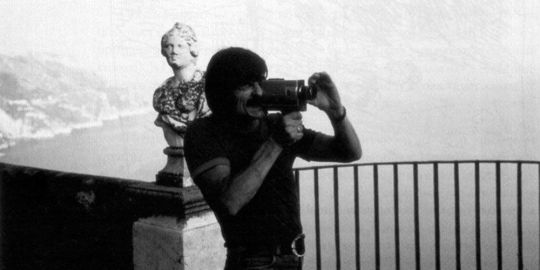
The only documentary directed by Tarkovsky, Voyage in Time focused on his travels in Italy with screenwriter/co-director Tonino Guerra as they prepared to shoot the former's drama feature Nostalghia.
Voyage In Time serves as an interesting peek into Tarkovsky's psyche as a filmmaker and as a person as he and Guerra delve into philosophical matters among their usual conversations on cinema. Further, the director also touches upon his other influences that include Federico Fellini, Jean Vigo, and several others.
8 The Steamroller And The Violin (1961) - 7.4

The Steamroller And The Violin was Tarkovsky's third diploma film during his student days at State Institute of Cinematography, Moscow. It happens to one of his most emotion-driven films as it explores the friendship between a young violinist (Igor Fomchenko) and an aging steamroller operator (Vladimir Zamansky).
RELATED: 10 Soviet Classic Films That Made An Impact On World Cinema
Facing a general sense of isolation from society, both friends spend their evenings talking to each other about their day-to-day activities. While the boy usually plays his violin, the old man delves into his past telling his friend stories from the War.
7 Mirror (1975) - 8.1
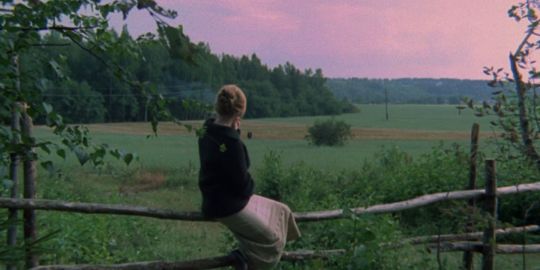
For some cinephiles, Mirror would possibly be Tarkovsky's most enigmatic film largely due to its free-flowing non-linear structure and a sense of storytelling that would resemble the 'stream of consciousness' style of writing (popularized by James Joyce and Virginia Woolf).
In its essence, the film recalls a dying poet's final days as he remembers his life and remnants of Soviet history and society. There's a lot to interpret in Mirror easily making it a film worth multiple viewings. While Tarkovsky authored the screenplay, the film heavily incorporates poems written and recited by his father Arseny Tarkovsky.
6 Solaris (1972) - 8.1
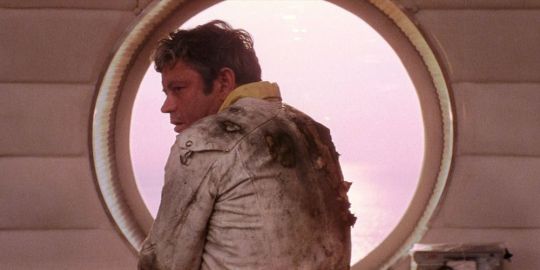
Solaris, along with classics like 2001: A Space Odyssey, can largely be credited in ushering in an age of introspective, thoughtful space sci-fi that focused on human themes rather than just a fascination for the extraterrestrial. Solaris revolves around a space station inhabited by a crew displaying bizarre emotional traits, that are further analyzed by psychologist Kris Kelvin (Donatas Banionis) when he arrives at the station.
RELATED: 10 Sci-Fi Movies That Only Make Sense On A Rewatch
Solaris won the Grand Prix at Cannes and established Tarkovsky as a visionary in sci-fi cinema. Many of his ideas would be further explored in Stalker.
5 Stalker (1979) - 8.1
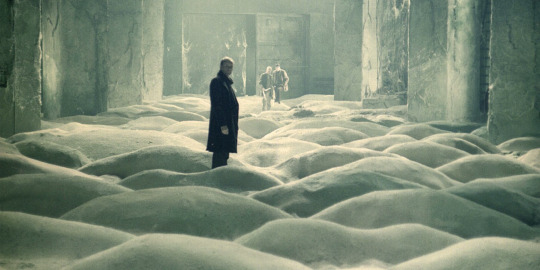
Just like Solaris, Stalker is a sci-fi tale rooted in philosophical questions. Even though it drew mixed reviews initially, it is yet again regarded as one of the finest sci-fi films today.
Alexander Kaidanovsky plays the ominous 'Stalker,' a man entrusted with transporting people to the 'Zone.' This so-called 'Zone' is a region where anyone's innermost desires can be fulfilled. Despite its thoughtful musings, the film also brims with a thriller-like aura that would keep audiences guessing about the actual nature of the grim, distant future of Stalker.
4 Andrei Rublev (1966) - 8.1
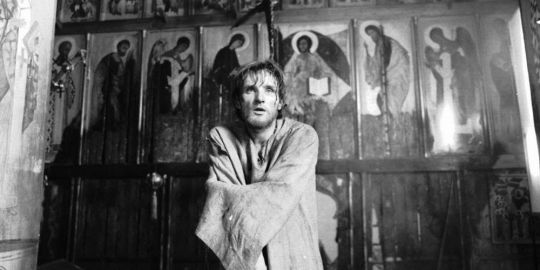
Even though Andrei Rublev is set in medieval Russia, its dominant theme of artistic freedom is very much relevant in present times. The titular personality (Anatoly Solonitsyn) is an iconographer who opposes an oppressive regime while pursuing his art. For its direct jabs at authoritarian states all over the world, Andrei Rublev either faced censorship or a total ban in its initial run.
RELATED: 10 Best Movies About Famous Artists, According To IMDb
Apart from serving as a fictionalized biopic of its protagonist, Tarkovsky's sophomore feature film was a bold case study of Russian society in the fifteenth century, an era characterized by religious power struggles and the eventual transition to Tsardom.
3 The Sacrifice (1986) - 8.1
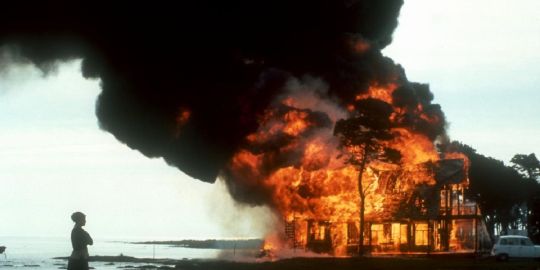
Offret aka The Sacrifice was Tarkovsky's final directorial effort before he succumbed to terminal lung cancer. The film can be described as magical realism at its finest as it centers around a heavily nuanced take on humanity and religion. In order to stop an impending nuclear holocaust, an intellectual attempts to negotiate with God, a deal that would require a 'sacrifice.'
Opening to rave reviews, the Swedish-language film earned Tarkovsky his second Grand Prix at Cannes along with a BAFTA for Best Film Not In The English Language.
2 Nostalghia (1982) - 8.1

Nostalghia (alternatively released as Nostalgia) was Tarkovsky's first film shot outside the Soviet Union, incorporating some of his own notions of homesickness. It stars Oleg Yankovsky as a writer studying the life of a Russian composer who spent his final days in Italy. While exploring the Italian countryside, he himself goes through bouts of isolation and displacement.
The autobiographical nature in Nostalghia is clear to see with the narrative further adorned with memorable Tarkovsky elements like dream sequences and a hopeless protagonist.
1 Ivan's Childhood (1962) - 8.1
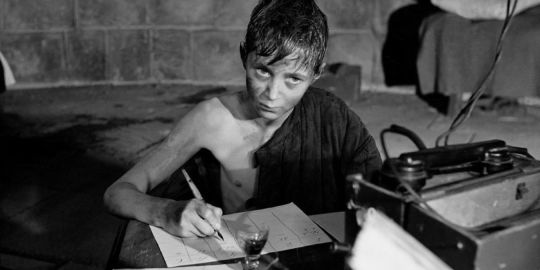
Barring his student films, Ivan's Childhood marked Andrei Tarkovsky's full-fledged directorial debut, going down in cinematic history as one of the best first films ever.
The movie endures as a brilliant example of expressing the human cost of war as it studies wartime trauma from the eyes of an orphaned boy Ivan (Nikolai Burlyayev). Losing his parents to German forces, Ivan struggles to survive as the Second World War rages on affecting both sides of the conflict. A hard-hitting feature, it boldly proclaimed its director's anti-war sentiments.
NEXT: The 10 Best World War II Epics, Ranked
Top 10 Andrei Tarkovsky Movies, According To IMDb | ScreenRant from https://ift.tt/3fSdXNo
1 note
·
View note
Photo

‘Shape of Water’ And ‘Three Billboards’ Lead 2018 BAFTA Awards Nominations
BEST FILM “Call Me By Your Name,” Emilie Georges, Luca Guadagnino, Marco Morabito, Peter Spears “Darkest Hour,” Tim Bevan, Lisa Bruce, Eric Fellner, Anthony McCarten, Douglas Urbanski “Dunkirk,” Christopher Nolan, Emma Thomas “The Shape of Water,” Guillermo del Toro, J. Miles Dale “Three Billboards Outside Ebbing, Missouri” Graham Broadbent, Pete Czernin, Martin McDonagh
OUTSTANDING BRITISH FILM “Darkest Hour,” Joe Wright, Tim Bevan, Lisa Bruce, Eric Fellner, Anthony McCarten, Douglas Urbanski “The Death of Stalin,” Armando Iannucci, Kevin Loader, Laurent Zeitoun, Yann Zenou, Ian Martin, David Schneider “God’s Own Country,” Francis Lee, Manon Ardisson, Jack Tarling “Lady Macbeth,” William Oldroyd, Fodhla Cronin O’Reilly, Alice Birch “Paddington 2,” Paul King, David Heyman, Simon Farnaby “Three Billboards Outside Ebbing, Missouri,” Martin McDonagh, Graham Broadbent, Pete Czernin
OUTSTANDING DEBUT BY A BRITISH WRITER, DIRECTOR OR PRODUCER “The Ghoul,” Gareth Tunley (Writer/Director/Producer), Jack Healy Guttman & Tom Meeten (Producers) “I Am Not A Witch,” Rungano Nyoni (Writer/Director), Emily Morgan (Producer) “Jawbone,” Johnny Harris (Writer/Producer), Thomas Napper (Director) “Kingdom of Us,” Lucy Cohen (Director) “Lady Macbeth,” Alice Birch (Writer), William Oldroyd (Director), Fodhla Cronin O’Reilly (Producer)
FILM NOT IN THE ENGLISH LANGUAGE “Elle,” Paul Verhoeven, Saïd Ben Saïd “First They Killed My Father,” Angelina Jolie, Rithy Panh “The Handmaiden,” Park Chan-wook, Syd Lim “Loveless,” Andrey Zvyagintsev, Alexander Rodnyansky “The Salesman,” Asghar Farhadi, Alexandre Mallet-Guy
DOCUMENTARY “City of Ghosts,” Matthew Heineman “I Am Not Your Negro,” Raoul Peck “Icarus,” Bryan Fogel, Dan Cogan “An Inconvenient Sequel,” Bonni Cohen, Jon Shenk “Jane,” Brett Morgen
ANIMATED FILM “Coco,” Lee Unkrich, Darla K. Anderson “Loving Vincent,” Dorota Kobiela, Hugh Welchman, Ivan Mactaggart “My Life As A Courgette,” Claude Barras, Max Karli
DIRECTOR “Blade Runner 2049,” Denis Villeneuve “Call Me By Your Name,” Luca Guadagnino “Dunkirk,” Christopher Nolan “The Shape of Water,” Guillermo del Toro “Three Billboards Outside Ebbing, Missouri,” Martin McDonagh
ORIGINAL SCREENPLAY “Get Out,” Jordan Peele “I, Tonya,” Steven Rogers “Lady Bird,” Greta Gerwig “The Shape of Water,” Guillermo del Toro, Vanessa Taylor “Three Billboards Outside Ebbing, Missouri,” Martin McDonagh
ADAPTED SCREENPLAY “Call Me By Your Name,” James Ivory “The Death of Stalin,” Armando Iannucci, Ian Martin, David Schneider “Film Stars Don’t Die In Liverpool,” Matt Greenhalgh “Molly’s Game,” Aaron Sorkin “Paddington 2,” Simon Farnaby, Paul King
LEADING ACTRESS Annette Bening, “Film Stars Don’t Die in Liverpool” Frances McDormand, “Three Billboards Outside Ebbing, Missouri” Margot Robbie, “I, Tonya” Sally Hawkins, “The Shape of Water” Saoirse Ronan, “Lady Bird”
LEADING ACTOR Daniel Day-Lewis, “Phantom Thread” Daniel Kaluuya, “Get Out” Gary Oldman, “Darkest Hour” Jamie Bell, “Film Stars Don’t Die in Liverpool” Timothée Chalamet, “Call Me by Your Name”
SUPPORTING ACTRESS Allison Janey, “I, Tonya” Kristen Scott Thomas, “Darkest Hour” Laurie Metcalf, “Lady Bird” Lesley Manville, “Phantom Thread” Octavia Spencer, “The Shape of Water”
SUPPORTING ACTOR Christopher Plummer, “All the Money in the World” Hugh Grant, “Paddington 2” Sam Rockwell, “Three Billboards Outside Ebbing, Missouri” Willem Dafoe, “The Florida Project” Woody Harrelson, “Three Billboards Outside Ebbing, Missouri”
ORIGINAL MUSIC “Blade Runner 2049,” Benjamin Wallfisch, Hans Zimmer “Darkest Hour,” Dario Marianelli “Dunkirk” Hans Zimmer “Phantom Thread,” Jonny Greenwood “The Shape of Water,” Alexandre Desplat
CINEMATOGRAPHY “Blade Runner 2049,” Roger Deakins “Darkest Hour,” Bruno Delbonnel “Dunkirk,” Hoyte van Hoytema “The Shape of Water,” Dan Laustsen “Three Billboards Outside Ebbing, Missouri,” Ben Davis
EDITING “Baby Driver,” Jonathan Amos, Paul Machliss “Blade Runner 2049,” Joe Walker “Dunkirk,” Lee Smith “The Shape of Water,” Sidney Wolinsky “Three Billboards Outside Ebbing, Missouri,” Jon Gregory
PRODUCTION DESIGN “Beauty and the Beast,” Sarah Greenwood, Katie Spencer “Blade Runner 2049,” Dennis Gassner, Alessandra Querzola “Darkest Hour,” Sarah Greenwood, Katie Spencer “Dunkirk,” Nathan Crowley, Gary Fettis “The Shape of Water,” Paul Austerberry, Jeff Melvin, Shane Vieau
COSTUME DESIGN “Beauty and the Beast,” Jacqueline Durran “Darkest Hour,” Jacqueline Durran “I, Tonya,” Jennifer Johnson “Phantom Thread,” Mark Bridges “The Shape of Water,” Luis Sequeira
MAKE UP & HAIR “Blade Runner 2049,” Donald Mowat, Kerry Warn “Darkest Hour,” David Malinowski, Ivana Primorac, Lucy Sibbick, Kazuhiro Tsuji “I, Tonya,” Deborah La Mia Denaver, Adruitha Lee “Victoria & Abdul,” Daniel Phillips “Wonder,” Naomi Bakstad, Robert A. Pandini, Arjen Tuiten
SOUND “Baby Driver,” Tim Cavagin, Mary H. Ellis, Julian Slater “Blade Runner 2049,” Ron Bartlett, Doug Hemphill, Mark Mangini, Mac Ruth “Dunkirk,” Richard King, Gregg Landaker, Gary A. Rizzo, Mark Weingarten “The Shape of Water,” Christian Cooke, Glen Gauthier, Nathan Robitaille, Brad Zoern “Star Wars: The Last Jedi,” Ren Klyce, David Parker, Michael Semanick, Stuart Wilson, Matthew Wood
SPECIAL VISUAL EFFECTS “Blade Runner 2049” Gerd Nefzer, John Nelson “Dunkirk,” Scott Fisher, Andrew Jackson “The Shape of Water,” Dennis Berardi, Trey Harrell, Kevin Scott “Star Wars: The Last Jedi,” Nominees tbc “War for the Planet of the Apes,” Nominees tbc
BRITISH SHORT ANIMATION “Have Heart,” Will Anderson “Mamoon,” Ben Steer “Poles Apart,” Paloma Baeza, Ser En Low
BRITISH SHORT FILM “Aamir,” Vika Evdokimenko, Emma Stone, Oliver Shuster “Cowboy Dave,” Colin O’Toole, Jonas Mortensen “A Drowning Man,” Mahdi Fleifel, Signe Byrge Sørensen, Patrick Campbell “Work,” Aneil Karia, Scott O’Donnell “Wren Boys,” Harry Lighton, Sorcha Bacon, John Fitzpatrick
EE RISING STAR AWARD (voted for by the public) Daniel Kaluuya Florence Pugh Josh O’Connor Tessa Thompson Timothée Chalamet
Congratulations to all the nominees!
21 notes
·
View notes
Photo




Director Andrey Zvyagintsev with actors Maryana Spivak and Alexey Rozin, and cinematographer Mikhail Krichman, and producer Alexander Rodnyansky attend a photocall for the film 'Loveless' (Nelyubov) during the 70th Cannes Film Festival, on May 18, 2017.
#cannes film festival#Andrey Zvyagintsev#maryana spivak#alexey rozin#loveless#nelyubov#Photocall#cannes2017#*
17 notes
·
View notes
Text
LFF17 Official Competition, Gala & Special Presentation reviews: “Downsizing”, “Call Me By Your Name”, “Lady Bird”, “Good Manners”, “Three Billboards Outside Ebbing, Missouri”, “You Were Never Really Here”, “Thoroughbreds”, “Loveless”, “The Shape of Water” and 13 others…
LFF17 Official Competition, Gala & Special Presentation reviews: “Downsizing”, “Call Me By Your Name”, “Lady Bird”, “Good Manners”, “Three Billboards Outside Ebbing, Missouri”, “You Were Never Really Here”, “Thoroughbreds”, “Loveless”, “The Shape of Water” and 13 others…

Films reviewed: “Battle of the Sexes”, “The Breadwinner”, “Breathe”, “Call Me By Your Name”, “Downsizing”, “A Fantastic Woman”, “The Florida Project”, “Good Manners” (pictured above), “The Killing of a Sacred Deer”, “Lady Bird”, “Last Flag Flying”, “Lean on Pete”, “Loveless”, “The Lovers”, “Mudbound”, “120 BPM (Beats Per Minute)”, “The Shape of Water”, “Sweet Country”, “Thoroughbreds”, “Three…
View On WordPress
#Alexander Payne#Andrew Haigh#Andrey Zvyagintsev#Andy Serkis#Azazel Jacobs#Cory Finley#Dee Rees#Greta Gerwig#Guillermo del Toro#Jonathan Dayton#Juliana Rojas#Luca Guadagnino#Lucrecia Martel#Lynne Ramsay#Marco Dutra#Martin McDonagh#Nora Twomey#Richard Linklater#Robin Campillo#Sean Baker#Sebastián Lelio#Valerie Faris#Warwick Thornton#Yorgos Lanthimos
0 notes
Text
Argentina Lucrecia Martel Australia Jane Campion (New Zealand) / George Miller Austria Michael Haneke (Germany) Belgium Chantal Akerman / Jean-Pierre Dardenne & Luc Dardenne Brazil Glauber Rocha Canada David Cronenberg / Atom Egoyan (Egypt) / Guy Maddin China Jia Zhangke / Zhang Yimou Denmark Carl Theodor Dreyer / Lars von Trier Finland Aki Kaurismäki France Olivier Assayas / Jacques Audiard / Jacques Becker / Robert Bresson / Leos Carax / Marcel Carné / Claude Chabrol / René Clair / Henri-Georges Clouzot / Jean Cocteau / Jacques Demy / Claire Denis / Julien Duvivier / Abel Gance / Philippe Garrel / Jean-Luc Godard / Patricio Guzmán (Chile) / Claude Lanzmann / Louis Malle / Chris Marker / Georges Méliès / Jean-Pierre Melville / Max Ophüls (Germany) / Maurice Pialat / Roman Polanski / Jean Renoir / Alain Resnais / Jacques Rivette / Eric Rohmer / Raúl Ruiz (Chile) / Jean-Marie Straub & Danièle Huillet / Jacques Tati / Bertrand Tavernier / François Truffaut / Agnès Varda (Belgium) / Jean Vigo Germany / West Germany Rainer Werner Fassbinder / Werner Herzog / F.W. Murnau / G.W. Pabst (Austria-Hungary) / Wim Wenders Greece Theo Angelopoulos Hong Kong Wong Kar-wai (China) / John Woo (China) Hungary Béla Tarr India Satyajit Ray Iran Abbas Kiarostami / Mohsen Makhmalbaf / Jafar Panahi Italy Michelangelo Antonioni / Dario Argento / Mario Bava / Bernardo Bertolucci / Vittorio De Sica / Federico Fellini / Sergio Leone / Pier Paolo Pasolini / Roberto Rossellini / Luchino Visconti Japan Shohei Imamura / Takeshi Kitano / Akira Kurosawa / Takashi Miike / Hayao Miyazaki / Kenji Mizoguchi / Mikio Naruse / Nagisa Oshima / Yasujiro Ozu / Seijun Suzuki Mauritania Abderrahmane Sissako Mexico Luis Buñuel (Spain) / Alejandro Jodorowsky (Chile) / Carlos Reygadas New Zealand Peter Jackson Poland Krzysztof Kieslowski / Andrzej Wajda Portugal Pedro Costa / Manoel de Oliveira Russia / USSR Sergei Eisenstein (Latvia) / Aleksandr Sokurov / Andrei Tarkovsky / Dziga Vertov (Poland) / Andrey Zvyagintsev Senegal Ousmane Sembene South Korea Bong Joon-ho / Hong Sang-soo / Park Chan-wook Spain Pedro Almodóvar / Victor Erice / Luis García Berlanga Sweden Roy Andersson / Ingmar Bergman / Victor Sjöström Taiwan Hou Hsiao-hsien (China) / Tsai Ming-liang (Malaysia) / Edward Yang (China) Thailand Apichatpong Weerasethakul Turkey Nuri Bilge Ceylan UK John Boorman / Danny Boyle / Terence Davies / Terence Fisher / Stephen Frears / Jonathan Glazer / Peter Greenaway / David Lean / Mike Leigh / Ken Loach / Joseph Losey (USA) / Alexander Mackendrick (USA) / Steve McQueen / Michael Powell / Michael Powell (UK) & Emeric Pressburger (Hungary) / Carol Reed / Nicolas Roeg / Ken Russell / Michael Winterbottom USA (A-D) Robert Aldrich / Woody Allen / Robert Altman / Paul Thomas Anderson / Wes Anderson / Darren Aronofsky / Hal Ashby / Tex Avery / Noah Baumbach / Kathryn Bigelow / Budd Boetticher / Peter Bogdanovich / Frank Borzage / Stan Brakhage / Tod Browning / Charles Burnett / Tim Burton / James Cameron (Canada) / Frank Capra (Italy) / John Carpenter / John Cassavetes / William Castle / Charles Chaplin (UK) / Joel Coen & Ethan Coen / Francis Ford Coppola / Sofia Coppola / Roger Corman / Alfonso Cuarón (Mexico) / George Cukor / Michael Curtiz (Hungary) / Joe Dante / Jules Dassin / Delmer Daves / Brian De Palma / André de Toth (Hungary) / Guillermo del Toro (Mexico) / Cecil B. DeMille / Jonathan Demme / Maya Deren (Ukraine) / William Dieterle (Germany) / Edward Dmytryk (Canada) / Stanley Donen / Stanley Donen & Gene Kelly / Allan Dwan (Canada) USA (E-L) Clint Eastwood / Blake Edwards / Abel Ferrara / David Fincher / Robert Flaherty / Richard Fleischer / Victor Fleming / John Ford / Milos Forman (Czechoslovakia) / Hollis Frampton / John Frankenheimer / William Friedkin / Samuel Fuller / Terry Gilliam / Michel Gondry (France) / Alejandro González Iñárritu (Mexico) / D.W. Griffith / James Gray / Henry Hathaway / Howard Hawks / Todd Haynes / Monte Hellman / Walter Hill / Alfred Hitchcock (UK) / John Huston / Jim Jarmusch / Spike Jonze / Phil Karlson / Elia Kazan (Turkey) / Buster Keaton / Henry King / Stanley Kubrick / John Landis / Fritz Lang (Austria) / Ang Lee (Taiwan) / Spike Lee / Mitchell Leisen / Mervyn LeRoy / Jerry Lewis / Joseph H. Lewis / Richard Linklater / Kenneth Lonergan / Ernst Lubitsch (Germany) / George Lucas / Sidney Lumet / David Lynch USA (M-V) Terrence Malick / Joseph L. Mankiewicz / Anthony Mann / Michael Mann / Leo McCarey / Vincente Minnelli / Michael Moore / Errol Morris / Mike Nichols (Germany) / Christopher Nolan (UK) / Alexander Payne / Sam Peckinpah / Arthur Penn / Sydney Pollack / Otto Preminger (Austria-Hungary) / Sam Raimi / Bob Rafelson / Nicholas Ray / Kelly Reichardt / Rob Reiner / George A. Romero / Alan Rudolph / John Sayles / Martin Scorsese / Ridley Scott (UK) / Don Siegel / Robert Siodmak (Germany) / Douglas Sirk (Germany) / Steven Soderbergh / Steven Spielberg / George Stevens / Oliver Stone / John Sturges / Preston Sturges / Quentin Tarantino / Frank Tashlin / Jacques Tourneur (France) / Edgar G. Ulmer (Austria-Hungary) / Gus Van Sant / Paul Verhoeven (Netherlands) / King Vidor / Josef von Sternberg (Austria) / Erich von Stroheim (Austria) USA (W-Z) Raoul Walsh / Andy Warhol / Peter Weir (Australia) / Orson Welles / William Wellman / James Whale (UK) / Billy Wilder (Austria-Hungary) / Robert Wise / Frederick Wiseman / William Wyler (Germany) / Robert Zemeckis / Fred Zinnemann (Austria-Hungary)
1 note
·
View note